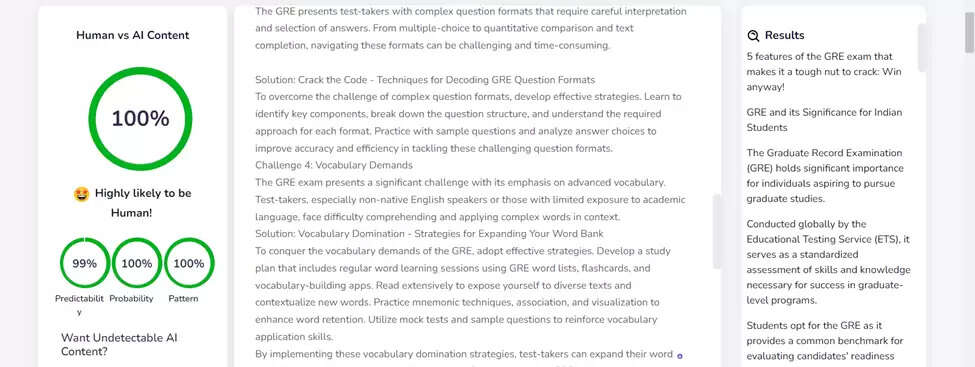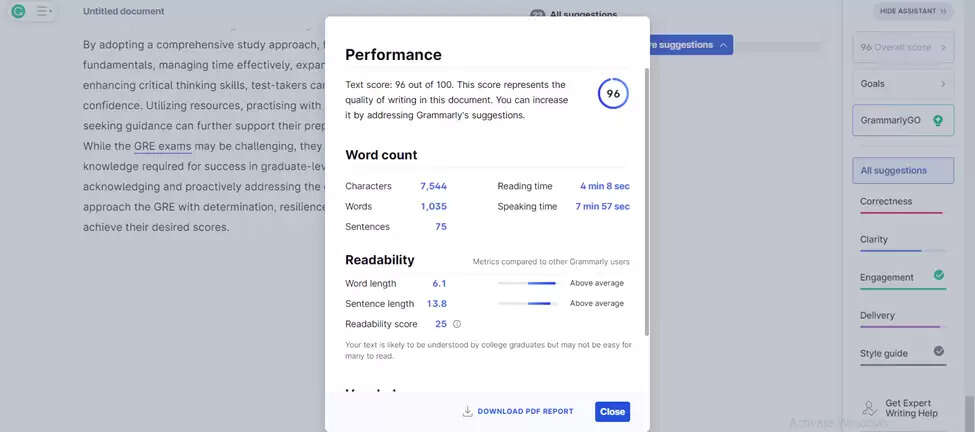5 features of the GRE exam that makes it a tough nut to crack: Win anyway!

What is GRE and its Significance for Indian Students:
The Graduate Record Examination (GRE) holds significant importance for individuals aspiring to pursue graduate studies. Conducted globally by the Educational Testing Service (ETS), it serves as a standardized assessment of skills and knowledge necessary for success in graduate-level programs. Students opt for the GRE as it provides a common benchmark for evaluating candidates' readiness across diverse academic backgrounds.
By assessing verbal reasoning, quantitative reasoning, analytical writing, and critical thinking, the GRE aids in informed admissions decisions. Its significance lies in providing a fair and standardized platform for universities to evaluate applicants' potential to excel in advanced academic pursuits.
Indian students appear for the GRE to pursue higher education opportunities abroad. The GRE score is widely accepted by universities in countries like the United States and Canada. It serves as an essential requirement for admission to various graduate programs, scholarships, and assistantships, attracting Indian students seeking global academic exposure and career prospects.
Is GRE as difficult as they say?
Alright, buckle up and let's dive into the wild world of GRE exams. It's like wrestling an octopus while solving Sudoku puzzles—challenging, to say the least! But fear not, my fellow test-takers, for we shall conquer this beast together. Today, we'll explore the five notorious factors that make the GRE exams a formidable challenge. From the broad content knowledge covering a wide range of subjects to the pressure of managing time effectively, each hurdle presents unique difficulties. By adopting effective strategies and thorough preparation, we can confidently confront these challenges and overcome them to achieve success. So, let's grab our study materials and embark on this adventurous journey to conquer the GRE like true champions!
Let’s get the hard part out of the way first and then arrive at practical solutions to bust them. So let’s explore the top-5 things test-takers find challenging about GRE examinations.
Challenge 1: Broad Content Knowledge and Importance of a Strong Foundation:
The GRE exam presents a significant challenge with its wide range of subjects, making a strong foundation crucial. From mathematics, vocabulary, and reading comprehension to analytical writing, test-takers must navigate diverse disciplines.
Solution: Master the Fundamentals - A Comprehensive Study Approach.
Developing a solid foundation in each subject is essential to conquer the GRE. Allocate time to study the core concepts, utilize study materials and resources, and practice extensively. Building a strong foundation empowers you to tackle the breadth of subjects effectively, enhancing your overall performance on the exam.
Challenge 2: Time Constraints
The GRE exam imposes strict time limits, pressuring test-takers to complete multiple sections within the allotted timeframe. Managing time effectively becomes crucial, as it requires strategic planning, quick decision-making, and mental stamina to maintain focus throughout the exam. Time scarcity and the need to balance accuracy and speed pose additional challenges.
Solution: Time Management Tactics - Strategies for Efficient Exam Navigation
To conquer time constraints, implement effective time management tactics. Prioritize questions based on difficulty, allocate time wisely for each section, and maintain a steady pace. Utilize time-saving strategies like educated guessing and practice with timed mock exams. These tactics optimize performance and ensure efficient navigation of the exam.
Challenge 3. Complex Question Formats
The GRE presents test-takers with complex question formats that require careful interpretation and selection of answers. From multiple-choice to quantitative comparison and text completion, navigating these formats can be challenging and time-consuming.
Solution: Crack the Code - Techniques for Decoding GRE Question Formats
To overcome the challenge of complex question formats, develop effective strategies. Learn to identify key components, break down the question structure, and understand the required approach for each format. Practice with sample questions and analyze answer choices to improve accuracy and efficiency in tackling these challenging question formats.
Challenge 4: Vocabulary Demands
The GRE exam presents a significant challenge with its emphasis on advanced vocabulary. Test-takers, especially non-native English speakers or those with limited exposure to academic language, face difficulty comprehending and applying complex words in context.
Solution: Vocabulary Domination - Strategies for Expanding Your Word Bank
To conquer the vocabulary demands of the GRE, adopt effective strategies. Develop a study plan that includes regular word learning sessions using GRE word lists, flashcards, and vocabulary-building apps. Read extensively to expose yourself to diverse texts and contextualize new words. Practice mnemonic techniques, association, and visualization to enhance word retention. Utilize mock tests and sample questions to reinforce vocabulary application skills.
By implementing these vocabulary domination strategies, test-takers can expand their word bank, improve comprehension abilities, and confidently tackle the GRE's vocabulary challenges.
Challenge 5: Critical Thinking and Reasoning
The GRE exam emphasizes analytical and critical thinking skills, requiring test-takers to analyze complex scenarios, evaluate information, and draw logical conclusions. This demands cognitive ability and effective reasoning skills. It presents a challenge as test-takers must navigate intricate scenarios, identify assumptions, evaluate evidence, and avoid logical fallacies while drawing accurate and well-reasoned conclusions.
Solution: Sharpen Your Mind - Enhancing Critical Thinking Skills for GRE Success
To conquer the challenge, engage in critical thinking activities such as puzzles, debates, and analyzing arguments from multiple perspectives. Practice identifying assumptions, evaluating evidence, and recognizing logical fallacies to strengthen analytical abilities. Develop a systematic problem-solving approach by breaking down complex scenarios into manageable components. Enhance the ability to draw logical conclusions by analyzing relationships between ideas and applying effective reasoning strategies. Familiarize yourself with common question types and their structures to approach them confidently.
Conclusion:
In conclusion, the GRE exams present a series of challenges that can make them appear difficult to test-takers. These challenges include the broad content knowledge required, time constraints, vocabulary demands, and critical thinking and reasoning skills.
By adopting a comprehensive study approach, focusing on mastering the fundamentals, managing time effectively, expanding vocabulary, and enhancing critical thinking skills, test-takers can navigate the GRE with confidence. Utilizing resources, practicing with sample questions, and seeking guidance can further support their preparation.
While the GRE exams may be challenging, they showcase the skills and knowledge required for success in graduate-level programs. By acknowledging and proactively addressing the difficulties, test-takers can approach the GRE with determination, resilience, and confidence to achieve their desired scores.
Reports:






